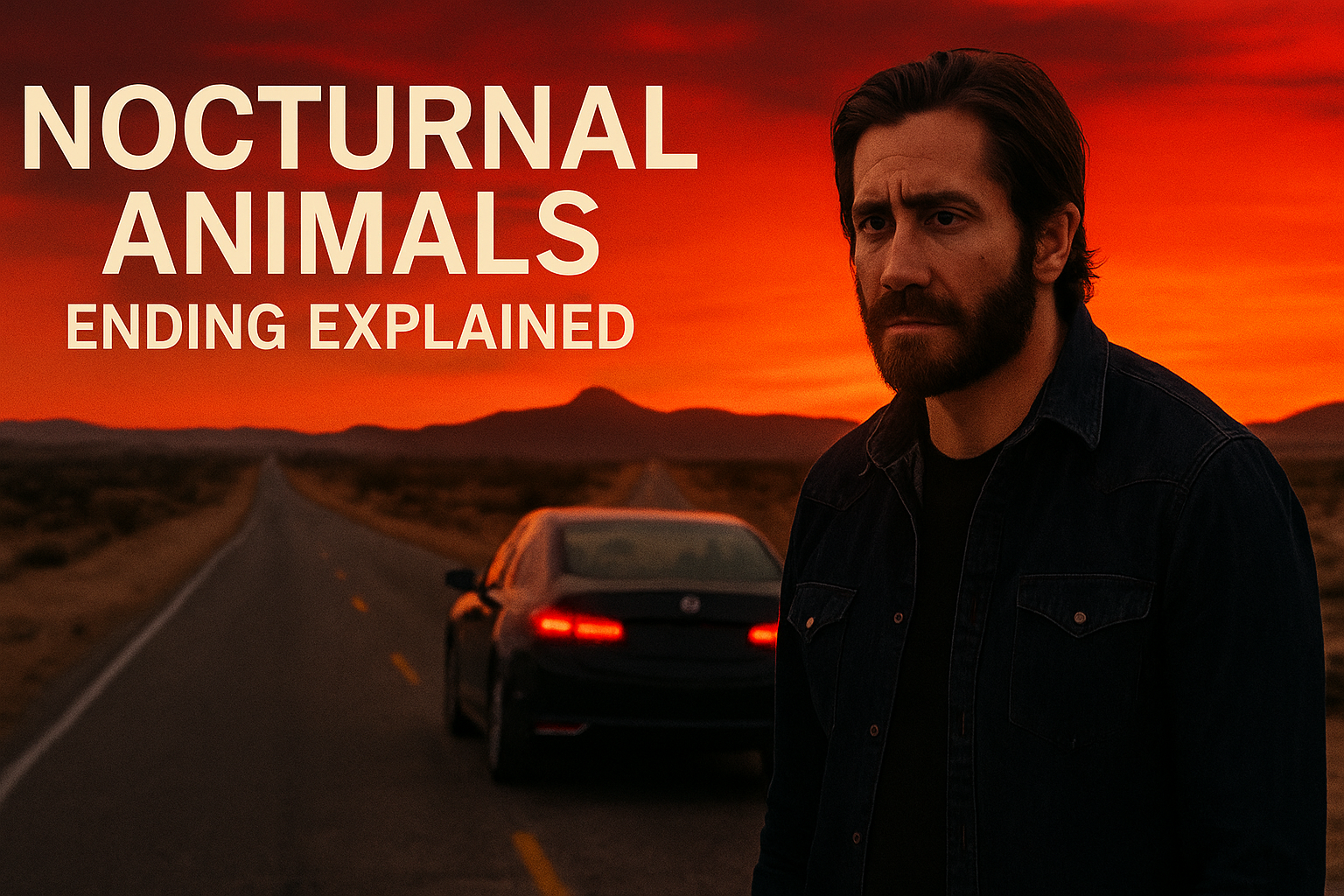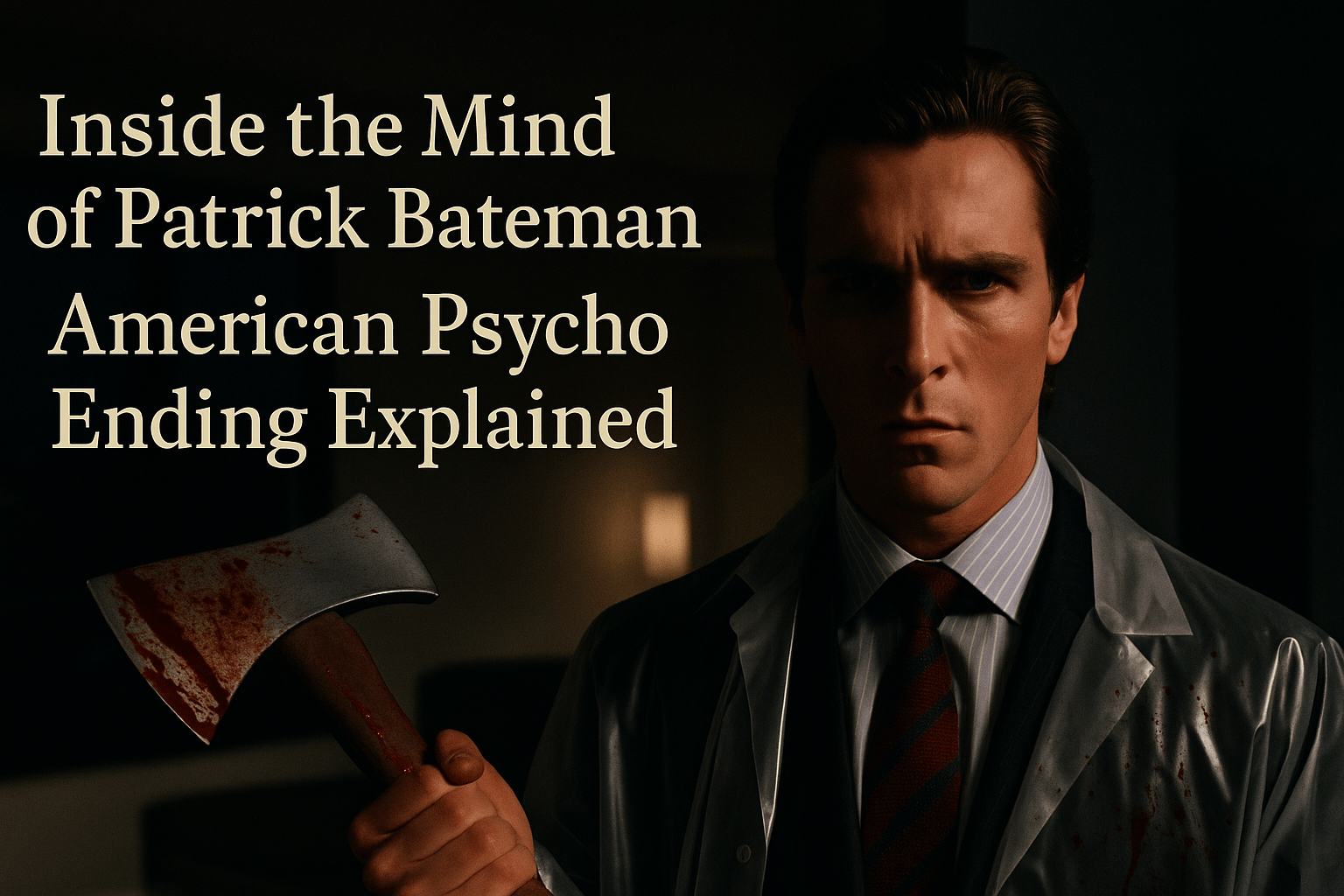
Nocturnal Animals is a film that leaves many viewers stunned, curious, and a little haunted. Directed by fashion icon-turned-filmmaker Tom Ford, this stylish thriller blends emotional drama with dark fiction, keeping us guessing about what’s real and what’s not.
Nocturnal Animals Ending Explained – What Really Happened and Why It Hurts So Much
At its core, it’s a story about love, pain, regret — and revenge served cold. The film ends on an ambiguous note that feels personal and poetic at the same time. In this post, we’ve got the full Nocturnal Animals ending explained — from the layered storyline to the powerful symbolism and what it all means.
A Quick, Spoiler-Free Summary
Before we dive deep, here’s a quick overview for anyone who hasn’t seen the movie or needs a refresher.
Susan (Amy Adams) is a wealthy art gallery owner stuck in a lifeless marriage. One day, she receives a manuscript from her ex-husband Edward (Jake Gyllenhaal). The manuscript is titled Nocturnal Animals and is dedicated to her.
As Susan begins to read, the story unfolds like a tense revenge thriller. But as she reads deeper, the lines between fiction and her own past begin to blur. The novel stirs painful memories — and leads to a final scene that’s as emotional as it is mysterious.
Inside the Manuscript – What Happens in Edward’s Novel?
The manuscript tells a fictional story that mirrors Edward’s emotional reality.
In the novel, Tony (also played by Jake Gyllenhaal) takes his wife and daughter on a road trip through Texas. One night, they’re harassed and kidnapped by three dangerous men. Tony survives, but his wife and daughter are found dead.
Consumed by guilt and rage, Tony teams up with a dying detective, Bobby Andes (Michael Shannon), to hunt down the killers. In a slow-burn journey of revenge, Tony finally kills the last man responsible — but dies himself in the process.
It’s a brutal, heartbreaking story of loss, justice, and emotional breakdown.
The Deeper Meaning of the Manuscript
So why did Edward send Susan this violent, disturbing story?
To understand the Nocturnal Animals ending explained, we have to see the manuscript as a metaphor. Tony is not just a fictional character — he’s Edward’s stand-in.
- Tony’s murdered wife and daughter represent Edward’s pain over Susan leaving him and aborting their child.
- The trauma and guilt Tony feels are a reflection of Edward’s emotional destruction after their breakup.
- The journey of revenge symbolizes Edward processing his grief and finally getting closure in his own way — through art.
Nocturnal Animals Ending Explained – The Final Scene
After finishing the manuscript, Susan reaches out to Edward. She sends him an email, asking to meet for dinner. She gets dressed up and waits alone at a fancy restaurant.
Time passes… and Edward never shows up.
The final shot lingers on Susan’s face — a mix of confusion, sadness, and deep regret. It’s quiet but devastating.
This scene is key to understanding the nocturnal animals ending explained — it’s not just about a missed dinner. It’s about an emotional turning point where Susan finally feels the weight of her past decisions.
Why Did Edward Not Show Up?
There are several possible explanations, and all of them say something powerful about Edward’s state of mind:
1. Revenge
Edward may have written the manuscript and set up the dinner meeting purely to make Susan feel abandoned, just like he once felt. After emotionally gutting her with the story, he ghosts her — his final move in a long game of quiet revenge.
2. Closure
Another idea is that Edward has moved on. Writing the novel gave him emotional closure, and he no longer needs to reconnect with Susan. Not showing up is a sign that he’s healed without needing her.
3. It Was All In Susan’s Mind
Some viewers believe Edward never planned to meet her, and the dinner was entirely her idea or a projection of her hope. In this reading, the ending is about Susan realizing that Edward is truly gone from her life — not just physically, but emotionally too.
Themes in the Ending
The ending of Nocturnal Animals is packed with meaning. Here are the key themes that come through:
- Regret: Susan is haunted by her past choices — the love she lost, the abortion, the life she could’ve had.
- Emotional Violence: The novel’s violence mirrors the emotional pain of their breakup.
- Art as Revenge: Edward doesn't hurt Susan with words or arguments — he uses his writing to make her feel what he felt.
- Power Shift: Once heartbroken, Edward now holds emotional power over Susan. She’s the one waiting, alone, hoping for a second chance.
For another film that explores trauma, guilt, and a twist that leaves you questioning everything, read our Shutter Island Ending Explained.
Symbolism and Visual Clues
Tom Ford fills the film with powerful visuals that deepen its meaning:
Mirrors and reflections:
Used to show the dual narrative — Susan's real world and the fictional world of the novel.
Red:
Often used to signal passion, pain, and violence — especially in Susan’s memories and during intense scenes.
Modern home vs gritty novel:
Susan’s life is cold and sterile, while Edward’s manuscript is raw, emotional, and real — highlighting the emptiness in her current world.
These visual cues support the story's emotional weight and make the nocturnal animals ending explained feel even more profound.
What Did Tom Ford Say About the Ending?
Tom Ford has said the film is about the emotional scars we leave on people — and how those scars don’t fade easily.
He purposely kept the ending open to interpretation, saying that he wanted viewers to decide whether Edward was being cruel, cathartic, or honest. Ford sees the film as a story about lost love, betrayal, and the haunting power of memory.
Fan Reactions and Theories
The internet had a lot to say about Nocturnal Animals:
- Many viewers believe Edward was cruel for ghosting Susan after leading her on.
- Others think it was a mature and artistic form of closure.
- Some see Susan as the real villain — someone who gave up a good man for a shallow life and now regrets it.
- The film sparked debate on Reddit, Letterboxd, and film forums, with theories about symbolism, the meaning of the title, and Susan’s fate.
Similarly, the ending of Mr. and Mrs. Smith left audiences divided over who truly had the upper hand. Dive into our Mr. and Mrs. Smith Ending Explained for a deeper look at power and performance in relationships.
A Story That Hurts in Silence
Getting the nocturnal animals ending explained isn’t just about the plot. It’s about what the story says emotionally.
This film-within-a-film explores how we deal with loss, guilt, and the desire for justice — not in courts or fights, but in memories, words, and art. Whether you see Edward’s actions as vindictive or poetic, one thing is clear: he made Susan feel everything he once felt.
And that’s what makes the ending hit so hard.
FAQs – Nocturnal Animals Ending Explained
Why didn’t Edward show up at the restaurant?
Either as revenge, for closure, or because he never intended to — it's left open to interpretation.
What does the title Nocturnal Animals mean?
It refers to people who are emotionally awake at night, haunted by their thoughts — like Susan and Edward.
Was the manuscript a metaphor?
Yes. The story is a symbolic reflection of Edward’s pain, using fiction to express emotional truth.
Did Susan actually regret her choices?
The ending suggests she did. Her reaction shows sadness, longing, and emotional loss.
What’s the significance of the last shot?
Susan’s face reveals that she now understands Edward’s pain — and that she may have lost him forever.




